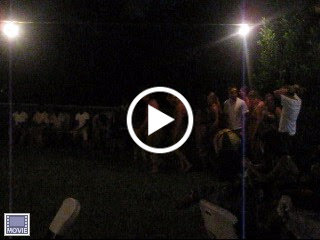 |
| Melanie and John, in the center, with |
This year the semester was done a bit differently, with the classes condensed to three days per week, and pairs of students being sent out to various schools and nonprofits to conduct various studies on ethnography (the scientific study of the customs of people and cultures). Two students were assigned to our partner, Hopeline Institute: Melanie Evans and John Veneklasen, who both had a special interest in business development.
In addition to studying ethnography, these two had specific objectives for Hopeline. The first was to conduct an impact assessment on the Village Savings and Loan (VSL) program (see earlier blogs for more info on this program) from the perspective of the individual, family, group, and community. The second objective was to help collect some media on the program - write some stories about individuals and VSL groups and create a brief video on the program. John and Melanie gallantly set out on motorcycles to drive with the field officers out into the villages where Hopeline Institute is doing their work.
They observed twenty VSL groups and then focused in specifically on four groups: one made up of young adults, one women's group, one generally diverse group, and one group that had significant challenges. In general they found that these groups work very well, with both individuals and communities benefiting, not just financially but also through trust, compassion, and the strengthening of communal ties. They found that women especially are benefiting. One person shared, in talking about their savings, "We are sitting on gold!" They had not recognized their savings potential before and have been able to increase their family's economic standing. They had a lot of other great feedback as well. These results were not surprising to us - it is what we also have seen - but to have independent persons come to do their own assessment and find similar conclusions is reassuring. The funding for this program comes to an end in June 2012, so Hopeline is working hard to figure out how to make this program sustainable so that they can continue to reach the 4000+ persons.
We are thankful to John and Melanie and wish them success as they return to the US!
On Monday, December 5, the students had their farewell dinner and showcased their new dancing skills as can be seen in the video below. The very first couple to do their solo number is Melanie and John. (The dance was performed outside in the evening, so unfortunately it's a little dark. Sorry!)

